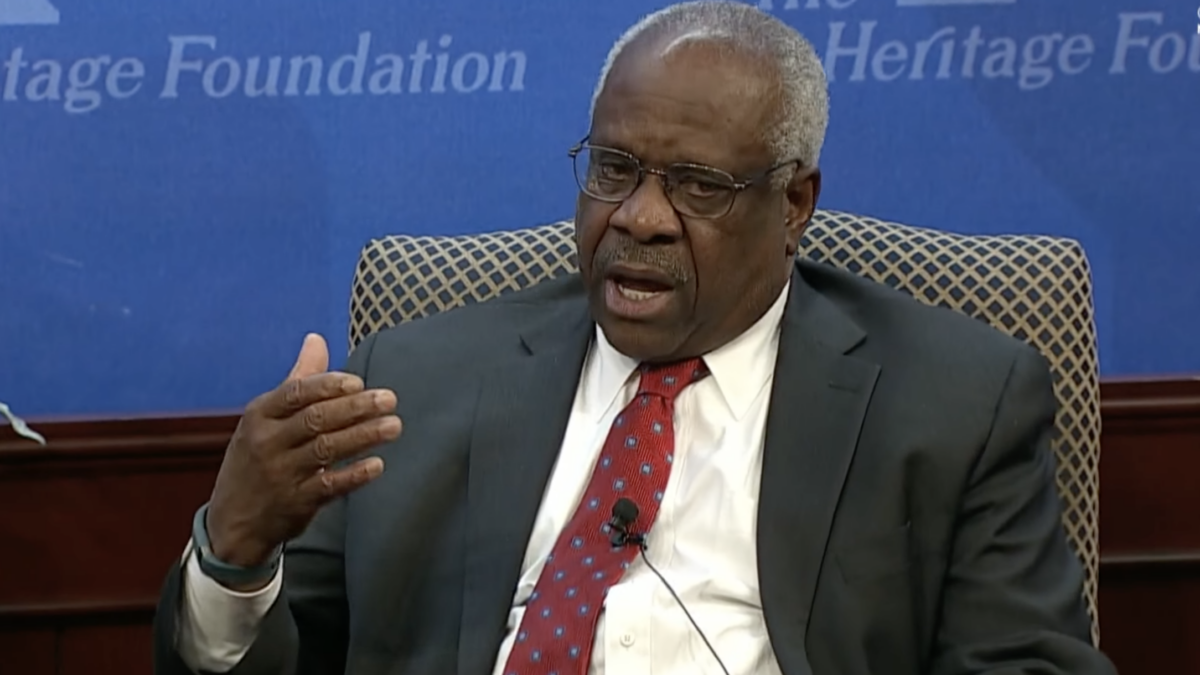It’s so predictable. Rep. Alexandria Ocasio-Cortez has now threatened Supreme Court Justice Clarence Thomas to resign or else face impeachment.
Leftists in Congress and the media hyperventilate over every tidbit showing that Justice Thomas’s wife, Ginni, is involved in national conservative politics – most recently, that she pushed for integrity in the 2020 election.
This isn’t news, and it has nothing to do with Justice Thomas’s ability to be a fair and impartial jurist. Yet the Left breathlessly deploys false and double standards because they are desperate to attack the justice who has been faithful to the United States Constitution they are constantly trying to hijack for their own political agenda.
In a country based on self-government, citizens must be informed about what their government is doing. Because the media won’t report this nonstory accurately, here are the facts.
1. Judicial Recusal is About Financial, Legal, Personal, and Professional Interests.
A federal statute governs when judges, including Supreme Court Justices, should recuse themselves: 28 U.S.C. Sec. 455. You can read it in just a couple of minutes on the internet.
The statute recites various circumstances in which a judge “shall disqualify himself” from a case, mainly financial, legal, personal, or professional interests of the Justice or a family member. The Wall Street Journal recently reported the big issue is that judges often fail to recuse themselves when they have a financial stake in the outcome of a case. There is not a word in the statute about a judge needing to recuse himself because he – much less a family member – has taken a public position on a political matter.
2. Political Views Do Not Require Recusal
Judges avoid wading into partisan politics out of prudence, not because of any legal obligation. They do so out of respect for the judicial role, which is nonpolitical: cases are decided on the law and the facts, even if the judge or a family member has a strong opinion about the matter at hand. A judge symbolically dons a black robe to reinforce that when he decides a case, he puts personal views aside.
All nine Supreme Court Justices have political views. It’s a good guess that each voted for the president who appointed them and for presidents and legislators of their own parties. If holding views about the 2020 election meant a justice couldn’t decide legal issues arising from it, then all nine would have to recuse themselves. It’s even more absurd when the political views at issue are those of a justice’s spouse.
The recusal statute also says a judge shall not sit on a case “in which his impartiality might reasonably be questioned.” This is the catch-all provision that the left-wing activists and news media claim requires Justice Thomas’s recusal.
The standard of reasonableness applies equally to all justices. Ruth Bader Ginsburg (not her husband, but the justice herself) was well known for her involvement at the ACLU on politically charged issues, including abortion. No one ever claimed she should recuse herself from deciding abortion cases.
Ed Rendell was head of the DNC, making many controversial political statements, while his wife was a sitting judge on the U.S. Court of Appeals for the 3rd Circuit. Judge Alice Batchelder’s husband was Speaker of the House of Ohio, making many partisan and controversial statements while she was the Chief Judge of the U.S. Court of Appeals for the 6th Circuit. No one ever claimed any of these judges had a basis to recuse themselves, much less to be impeached.
3. Recusal Standards Are Tied to the Constitution’s Lifetime Appointment of Judges
Article III of our Constitution provides that Supreme Court Justices serve for life. This is to protect judges from politics, not to protect politics from judges. It does not mean that jurists have to recuse themselves if they or a family member act upon their political views.
When a case presents a purely political rather than a legal question, the Court declines to adjudicate it, leaving it to the political branches of government, which under our Constitution are accountable to citizens. A case teeing up a purely political question won’t be decided by the Court. It turns the principle of a nonpolitical judiciary on its head to say that a political tempest on which most American citizens have opinions could force a Justice to recuse himself, much less be impeached.
Can you imagine if CNN had chased Justice Ginsburg into her garage to confront her about her abortion advocacy when she was coming home from the hospital after being treated for cancer? It’s unthinkable. Yet, CNN feels perfectly entitled to confront Justice and Mrs. Thomas as they arrive home from the hospital.
If the lazy and dishonest news media reported on real news stories, such as the corruption revealed on Hunter Biden’s laptop, we might have a different president now. But then they wouldn’t have the phony Ginni Thomas story to lie about, and Ocasio-Cortez wouldn’t have another excuse to attack one of the greatest Supreme Court Justices of all time, who has always kept his oath to uphold our Constitution.









